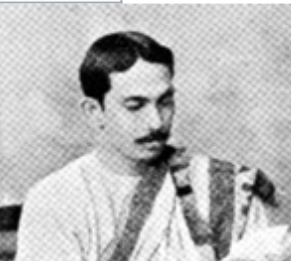Satyendranath Dutta (also spelt as Satyendranath Datta or Satyendra Nath Dutta) (Bengali: সত্যেন্দ্রনাথ দত্ত) (1882 – 25 June 1922), a Bengali poet, is considered the wizard of rhymes (or ছন্দের যাদুকর - chhonder jadukar in Bengali). Satyendranath Dutta was an expert in many disciplines of intellectual enquiry including medieval Indian history, culture, and mythology.
Satyendranath Dutta was the son of Rajaninath Dutta, who was a trader. He was born at Nimta, 24 Parganas (north). The family hailed from Chupi in Purba Bardhaman district on 11 February 1882. His grandfather, Akshay Kumar Datta, was a great thinker, Brahmo social reformer and writer who was the guiding spirit of the Tattwabodhini Patrika. After passing the school leaving examination from the Central Collegiate School, he received his graduate level education from the General Assembly’s Institution in Kolkata. Although he left (what is now) Scottish Church College without taking a degree, his training there helped him immensely for the future. After unsuccessfully to join the ranks of his father in their family business, he quit that to devote his energies entirely to scholarly pursuits.He wrote poems like Jatir Pati.
Works
Satyendranath Dutta composed poems and initially composed poems for the Bengali magazine Bharati. Although his stylistic nuances during this stage reflect the influence of Michael Madhusudan Dutt, Akshay Kumar Boral, and Debendranath Sen, his later poetry illustrates a greater resonance with the poetry of Rabindranath Tagore.
Dutta wrote under multiple pseudonyms, including Nabakumar, Kaviratna, Ashitipar Sharma, Tribikram Varman and Kalamgir.
Books of poems
- Sabita (The Sun, 1900)
- Sandhiksan (The Opportune Moment, 1905)
- Benu O Bina (Flute and Lyre, 1906)
- Hom Shikha (The Blaze of the Yagya, 1907)
- Fuler Fasal (The Harvest of Flowers, 1911)
- Kuhu O Keka (Song of Cuckoo and Peahen, 1912)
- Tulir Likhon (Written with a Brush, 1914)
- Abhra-Avir (1916)
- Hasantika (1919)
- Bela Sheser Gan (Song at Dusk, 1923)
- Biday-Arati (Farewell Hymn, 1924)
- Kavyasanchayan (Collected Poems, 1930)
- Shishu-Kavita (Children's Poetry, 1945)
- Bhorai (The song of Dawn)
- Tirtha-renu
- Tirtha-Salil
